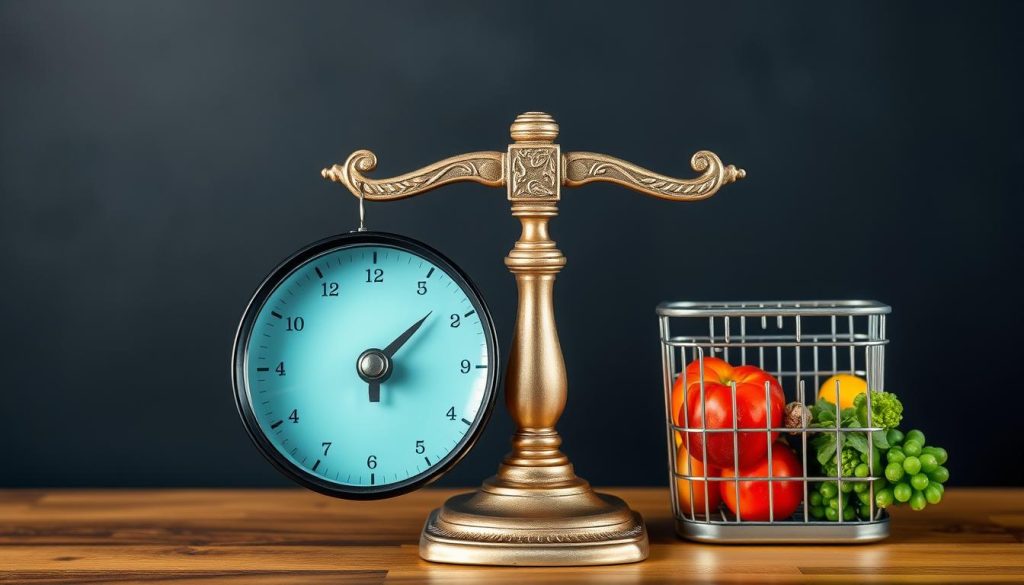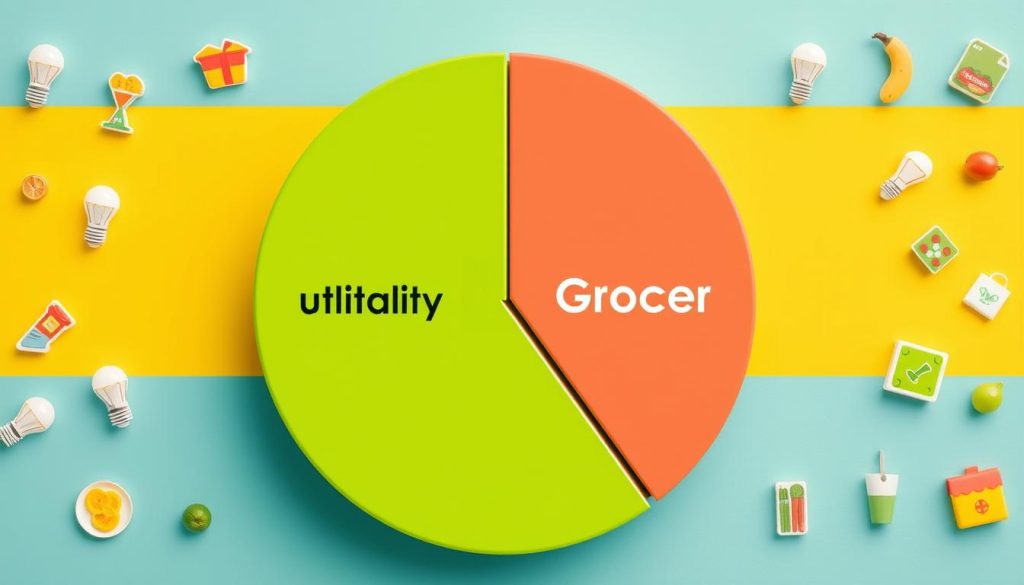Planning your budget every month is key to keeping your finances in check, especially for your big spends on utilities and groceries. In this piece, we’ll look at how to handle costs better in these important areas with handy advice. By getting smart with financial planning, you can better manage your money each month and ease the worry over costs that can change.
- Understanding the Importance of Monthly Budgets
- Strategies for Reducing Utilities Costs
- Managing Groceries for Optimal Savings
- Crafting a Personalised Budget Plan
- Utilities and Groceries: Fixed vs. Variable Costs
- Assessing the Impact of Utility Bills
- Balancing Utilities and Grocery Costs
- Cost-Saving Tips for Utilities and Groceries
- Analysing Your Monthly Spending on Utilities and Groceries
- Using Technology to Track and Budget Expenses
- How to Handle Unexpected Utility Costs
- Plan Ahead: Budgeting for Special Occasions
- The Benefits of Meal Planning to Curb Grocery Spending
- FAQ
Key Takeaways
- Understand the importance of monthly budget planning for utilities and groceries
- Identify strategies to effectively manage household expenses
- Explore ways to reduce utilities costs through smart investments
- Learn methods to optimise grocery shopping for better savings
- Gain insights into balancing fixed and variable costs
Understanding the Importance of Monthly Budgets
Monthly budgets are key to better financial understanding and staying in control. By keeping track of your budgeting essentials, you manage your money well. This helps plan your monetary future.
Expense tracking is vital. It helps you and your family find where you can save. This step is key to avoid spending on what you don’t need. Instead, you focus on essentials like house bills and food.
Saving money needs a keen eye on every expense. This way, you ensure all financial needs are met without missing out on savings. By doing this, you’re set to reach your money goals with ease.
Grasping monthly budgeting is essential for smart money management. It boosts your financial literacy. This means you’ll be wiser about spending and saving. Such habits build a stable financial future.
Strategies for Reducing Utilities Costs
Today, it’s key to handle utility costs well to keep a budget on track. Knowing and using cost-saving steps can save a lot of money.
Evaluating Your Current Usage
Start by checking how much energy you use. By looking at your energy use, you can see where you’re using too much. Smart meters and apps can help show where you can cut down.
Negotiating Better Rates
Talking to utility companies can also help. They might have better prices they don’t tell everyone about. Speaking with them could lower your bills. Watching the market lets you find good deals from others too.
Investing in Energy-Efficient Appliances
Buying appliances that use less energy is a smart move. These appliances are rated for efficiency, which makes choosing easy. They cost more at first, but save money and help the planet in the long run.
Using these tips can really lower your bills and help the earth. You’ll spend less and do good for the environment.
| Strategy | Potential Savings | Impact on Energy Efficiency |
|---|---|---|
| Evaluating Current Usage | Up to 15% | High |
| Negotiating Better Rates | Up to 10% | Moderate |
| Investing in Energy-Efficient Appliances | Up to 20% | Very High |
Managing Groceries for Optimal Savings
Managing your grocery budget well can really boost your monthly finances. By using smart strategies, you can save a lot on your groceries. You’ll enjoy the perks of making shopping lists, joining loyalty programs, and learning when to buy in bulk.
Creating a Shopping List
Having a shopping list is key to saving money on groceries. It stops you from buying things you don’t need and makes sure you buy only what’s necessary. Also, plan your meals using things you already have at home.
This approach prevents wasting food and controls your spending.
Utilising Loyalty Programmes
Many supermarkets have loyalty programs that save you money over time. By joining, you earn points on what you buy which you can swap for discounts or offers. These programs also give members special deals and coupons, helping you save even more.
Buying in Bulk
Buying in bulk can save you a lot of money in the long run. It’s cheaper to buy non-perishable items like canned food, grains, and other essentials in large quantities. But, be sure not to buy too much of things that can spoil. Using the right storage can keep bulk items fresh.
Crafting a Personalised Budget Plan
Making your own budget plan is key to keeping your finances in check. It’s about having a good balance between what you earn and spend. By setting clear goals, keeping an eye on your spending every week, and changing your budget with the seasons, you’ll be better in charge of your money’s future. Let’s explore how to create your personalised budget plan.
Setting Realistic Goals
When you set goals for your budget, it helps guide your money in the right direction. Think about what’s important to you, like saving for a trip, paying off debts, or putting aside money for emergencies. Make these goals specific and possible to achieve. This will make the journey towards financial stability easier and clearer.
Monitoring Weekly Expenses
Watching how you spend your money weekly is crucial. It lets you see clearly where your cash goes. Use budgeting apps or tools to spot your spending habits. This helps you stay on track, keep within your budget, and cut down on spending you don’t need.
Adjusting for Seasonal Changes
Changing your budget with the seasons is necessary. For example, winter might bring higher heating bills or the holidays might mean spending more on food. Adapt your budget to these changes to keep your finances balanced. This way, you can avoid spending more than you have.
Utilities and Groceries: Fixed vs. Variable Costs
Understanding the difference between fixed and variable expenses is key for good financial planning. This applies when you look at utilities and groceries. Knowing the two helps you manage your budget and sort your costs better.
Fixed expenses don’t change each month. For example, your broadband or a fixed energy rate falls into this category. Some grocery costs, like a subscription box, are fixed too.
Variable expenses, however, change based on what you use or choose. Water or electricity bills can go up or down. Groceries usually vary too, as what you buy each week changes.
It’s important to correctly sort costs. This lets you see where you can save money. It also makes budgeting and future cost predictions easier.
| Expense Type | Utilities | Groceries |
|---|---|---|
| Fixed Expenses | Broadband Subscription, Fixed-Rate Energy | Subscription Box, Preset Delivery |
| Variable Expenses | Water Bill, Electricity Bill | Weekly Purchases, Market-dependent Items |
By knowing the difference between fixed and variable costs for utilities and groceries, you can budget better. This not only helps with accurate financial planning but also in cutting down on extra spending.
Assessing the Impact of Utility Bills
It’s key to know how utility bills affect your monthly budget. By analyzing your utility bills fully, you can see where your money goes. This will cover how much you spend on utilities and how changes through the year can hit your budget.
Monthly Breakdown of Utility Expenses
Looking into your monthly utility bills means checking costs like electricity, gas, water, and internet. This helps spot big spends and places to save money. Let’s look at an example:
| Utility | Average Monthly Cost (£) |
|---|---|
| Electricity | 60 |
| Gas | 40 |
| Water | 30 |
| Internet | 35 |
Seasonal Variations in Utility Bills
Utility bills change with the seasons, often costing more at certain times. This is seen in higher heating bills in winter and cooling in summer. A yearly expense breakdown helps families plan for these changes:
| Month | Electricity (£) | Gas (£) |
|---|---|---|
| January | 70 | 50 |
| July | 55 | 30 |
Balancing Utilities and Grocery Costs
Strategic planning helps in managing utilities and grocery costs well. Understanding what affects these expenses can help you save money. This can make a big difference to your financial health.
Prioritising Essential Expenses
Knowing what you really need is the first step. For example, bills for electricity, water, and heating are a must. The same goes for food essentials like fruits, dairy, and meats. Putting these first makes sure you live well without overspending.
Identifying Areas for Cutbacks
After sorting out must-haves, look for ways to spend less. Using less power and getting better deals on utilities can save cash. With food shopping, question each item’s need and choose cheaper options. Doing this can balance your expenses without losing out on your standard of living.
Cost-Saving Tips for Utilities and Groceries
Managing a monthly budget can be tough. However, wise strategies can cut costs on utilities and groceries. These tips can help you stick to your budget better.
Effective Energy Conservation Methods
It’s vital to save energy to reduce bills. You can make small changes, like turning down heaters in winter. In summer, try using fans over air conditioning. Also, remember to unplug devices when they’re not needed.
- Install energy-efficient light bulbs such as LEDs
- Invest in programmable thermostats to optimise heating and cooling
- Regularly service and maintain HVAC systems for efficiency
- Utilise natural sunlight during the day to lessen lighting costs
Smart Shopping Techniques
To shop wisely, always hunt for the best deals. Planning your grocery trips can save lots of money.
- Create and stick to a shopping list to avoid impulse purchases
- Buy in bulk where it makes sense, especially for non-perishable items
- Make use of loyalty programmes and coupons offered by retailers
- Consider generic brands which often provide the same quality as name brands
- Keep an eye on seasonal sales and promotions
Using both, energy-saving steps and clever shopping methods, can lead to big savings each month. This boosts your financial well-being.
Analysing Your Monthly Spending on Utilities and Groceries
Checking how much you spend every month is key for managing your home well. It lets you see where your money goes, highlighting areas where you might cut costs. Reviewing your budget regularly helps spot spending trends on things like water and food.
A detailed look at your spending gives you a clear picture of your finances. By keeping an eye on your costs, you can decide how to spend smarter. This means checking your bills and food expenses often to match your budget plans.
Start your spending check by noting down all costs for utilities and groceries:
- Write down all bills for electricity, gas, water, and internet.
- Keep track of your food shopping, either through receipts or apps.
- Look at your current costs compared to past months to spot changes.
This method helps you stay on track with your money goals. You’ll notice some bills change with the seasons, which is why ongoing checks are important.
| Expense Type | Current Month | Previous Month | Difference |
|---|---|---|---|
| Electricity | £90 | £85 | £5 |
| Gas | £50 | £45 | £5 |
| Water | £30 | £30 | £0 |
| Groceries | £400 | £390 | £10 |
Comparing these amounts can show you any sudden increases in spending. By regularly analysing your expenses, you find ways to keep your budget in check. This active management of your money leads to better financial health and less worry.
Using Technology to Track and Budget Expenses
In the digital age, using budgeting technology changes how we handle our money. Apps and tools make budgeting easier, giving you more control. They help you make choices based on clear information.
Finance Apps and Tools
Apps like Mint, YNAB (You Need a Budget), and PocketGuard are very helpful. They let you connect bank accounts, watch your spending, and sort expenses simply. Using these tools often keeps you informed about your money and stops you from spending too much.
Setting Up Alerts and Reminders
Setting alerts and reminders is a key feature of finance apps. These notices keep you in line with your budget by warning you if you’re spending too much or when it’s time to pay bills. By acting on these alerts, you pay on time and avoid extra charges. This shows how crucial budgeting technology is for managing finances.
How to Handle Unexpected Utility Costs
Dealing with sudden utility costs isn’t easy. A planned approach towards saving and preparing for possible rate increases can help. This can lessen the stress caused by unexpected bills. Let’s explore some effective ways to protect your budget from these surprises.
Emergency Fund Allocation
Setting aside money for emergencies is key. A strong emergency fund gives you a safety net during financial uncertainty. By saving a bit of your income each month, you create a cushion. This helps you handle unexpected costs without panic.
Planning for Utility Rate Hikes
Utility rates often go up. It’s vital to include this in your financial plans. Check your bills often and keep an eye on possible rate changes. By doing this, you can get ready for any future hikes. Planning for these increases helps keep your finances stable.
| Strategy | Description | Benefits |
|---|---|---|
| Emergency Fund Allocation | Setting aside a portion of income to cover sudden utility costs. | Provides financial security and reduces stress. |
| Rate Hike Strategies | Planning and budgeting for potential utility rate increases. | Minimises the impact of unexpected rate hikes. |
In sum, getting ready for surprises by saving up and planning for rate increases keeps your finances strong. This ensures you stay stable through unexpected financial changes.
Plan Ahead: Budgeting for Special Occasions
It’s really important to plan early for special occasions. Every year, we have events like birthdays, anniversaries, and holiday seasons. These can really affect your money if you’re not careful. By setting aside money early, you’ll be ready for these costs. This way, you won’t be caught off-guard by unexpected expenses.
Managing your money well for these events means you can have fun without worrying about spending too much. Begin by writing down all the events and holidays coming up. Then decide how much money you will need for each one. This kind of planning helps you enjoy yourself while also keeping your money situation stable.
Here are some handy tips to help with your spending for special days:
- Create a special savings account for birthdays and holidays.
- Adjust your usual monthly spending to save for these events.
- Look out for sales to buy gifts and decorations early at a lower price.
- Plan a budget for each event and make sure not to overspend.
| Event | Estimated Cost | Saving Timeline | Actual Spend |
|---|---|---|---|
| Birthday | £200 | 6 Months | £190 |
| Christmas | £500 | 12 Months | £480 |
| Anniversary | £150 | 3 Months | £145 |
By using these strategies and keeping a strict approach to your event budget, you can celebrate without financial worries. Planning well means you manage your money better. This leaves you to enjoy each special moment, stress-free.
The Benefits of Meal Planning to Curb Grocery Spending
Meal planning is a key strategy for saving money on groceries. It helps you use food more wisely and cuts extra costs. People in the UK who want to manage their budgets better find meal planning very helpful.
Planning Weekly Menus
Planning your meals each week is very important. It stops you from buying things on impulse and makes sure everything you buy is needed. First, check what you have at home. This stops you from buying the same thing twice and wasting food. By following your meal plan, you can buy items on sale, saving even more money.
Using Leftovers Effectively
Don’t throw away your leftovers; they can save you money. Use them in new dishes to make the most of your groceries. For example, use leftover chicken to make sandwiches or add it to soup. This way, you use every bit of your food, keeping your budget in check.
Being smart with meal planning and leftovers really helps cut grocery bills. As we all aim for more careful spending, these tips can reduce our costs. They make meal times easier and less stressful, too.




















